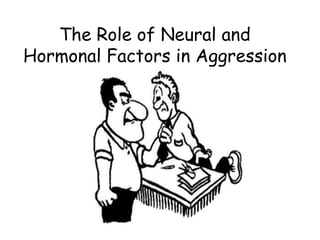
The role of neural and hormonal factors in aggression
- 1. The Role of Neural and Hormonal Factors in Aggression
- 2. Hormonal Factors What is the main hormone associated with aggression? Testosterone AO1 Hormonal Factors The ‘Basal model •Testosterone – androgen (produced by Leydig cells of testosterone’ in the make testes and adrenal cortex). suggests that the hormone causes a •Release hormone follows a natural circadian rhythm. change in a person’s •Levels of hormones reach a peak in young males and dominance. typically will gradually decline. Therefore, it follows that a •Relationship between aggression and testosterone man with high is not a simple biological ‘cause and effect’ levels of mechanism. testosterone will engage in anti- •Presence of testosterone simply increases the social behaviour chances of aggressive behaviour. such as fighting.
- 3. Evaluating Hormonal Factors AO2 Dabbs et al (1987) measured salivary testosterone in violent and non-violent crimes. Those with high levels of testosterone had a history of committing violent crimes, whereas those with lower levels had a history of non-violent crimes. This supports the role of increased testosterone being related to aggression. Deterministic Socially Sensitive Research
- 4. Evaluating Hormonal Factors AO2 An alternative approach...socialisiation. Parents can encourage specific behaviours in their children. IDEA’s – Cultural Differences Difficulty separating nature and nurture influences further illustrated in Aronson’s (1992) research on non-violent societies such as the Pygmies, Central Africa.
- 5. Evaluating Hormonal Factors AO2 Inconclusive Evidence: Harrison et al (2000) gave testosterone to 56 men (20-50 years old), when given a frustration-inducing computer game, aggressive responses were significantly increased. But this effect was not the same for the entire sample. If anything the changes were largely psychological and few had any noticeable physical effects on behaviour This suggests that there are large individual differences in the effects of testosterone on a person’s level of aggression. Rather we should view testosterone as one factor affecting aggression IDEA’s? AO3?
- 6. Neural Factors Neurotransmitters are chemicals that enable impulses to be transmitted from one area of the brain to another. AO1 Low Levels of Serotonin •Reduces aggression by inhibiting responses to emotional stimuli that might otherwise lead to an aggressive response. •Low levels of serotonin have been associated with increased susceptibility to impulsive behaviour, aggression and even violent suicide. •Some recreational drugs are thought to alter serotonin levels and thus increase aggressive behaviour. •Studies of pets that have been bread for low levels of aggression seem to have higher levels of serotonin.
- 7. AO2 Evaluating Neural Factors Evidence from non-human animal Mann et al (1990) gave 35 healthy studies adults dexfenfluramine, which is Raleigh at al (1991) have added known to deplete levels of support for the role of serotonin serotonin. Using a questionnaire to in aggression through carrying out assess hostility and aggression research on vervet monkeys. They levels, they found that found that individuals fed on a dexfenfluramine treatment in males diet high in trytophan (increases (but not females) was associated serotonin levels in the brain) with an increase in hostility and exhibited decreased levels of aggression scores. aggression. IDEA’s? AO3?
- 8. Neural Factors Neurotransmitters are chemicals that enable impulses to be transmitted from one area of the brain to another. AO1 High Levels of Dopamine •There is some evidence to suggest that a link between high levels of dopamine and aggression exist (although this link is not as well established as the link between serotonin and aggression). •Increases in dopamine activity through the use of amphetamines have also been associated with increases in aggressive behaviour. •Buitelaar (2003) suggested that antipsychotics which reduce dopamine activity in the brain have been shown to reduce aggressive behaviour.
- 9. AO2 Evaluating Neural Factors AO3? Problems establishing cause and effect •Recent research has suggested that elevated levels of dopamine maybe a consequence of aggressive behaviour. •Dopamine is involved with feelings of rewards IDEA’s? Reductionist....